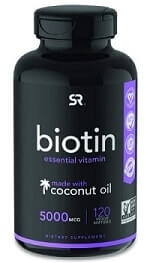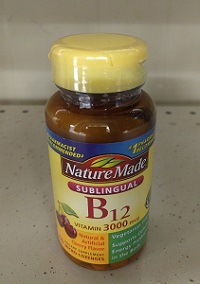I rarely write about vitamins, minerals and natural treatments for hair loss. Most men and women with pattern hair loss will not benefit from vitamin supplementation unless significantly deficient. The most cited vitamins that have been shown to benefit hair growth are Vitamin B7 (Biotin), Vitamin B12 and Vitamin D.
Several recent studies have shown a high correlation between low vitamin D levels and hair loss. Iron and Zinc deficiencies can also lead to hair loss.
In this post, I cover vitamin B7 and vitamin B12 for hair growth. Note that the full vitamin B-Complex includes all of the below:
- Thiamine (B1).
- Riboflavin (B2).
- Niacin (B3).
- Pantothenic Acid (B5).
- Pyridoxine (B6),
- Biotin (B7).
- Folate (B9).
- Cobalamin (B12).
You can search Amazon for the most popular and highly rated B-vitamins.
All the above B-vitamins are water soluble and play important roles in cell metabolism. Dietary intake recommendations can be found here.
Biotin (Vitamin B7) and Hair Growth

Biotin (vitamin B7) is by far and away the most popular vitamin ingredient in numerous hair loss products. Most popular hair loss shampoos also contain Biotin. A number of amino acid hair growth products also include Biotin. As does Viviscal.
However, I have not seen any reliable before and after photos of hair growth that can purely be attributed to Biotin containing products and supplements. At best, you will get faster and possibly thicker nail and hair growth. Especially if you are deficient in vitamin B7.
Note that Biotin is also known as vitamin H and vitamin B8 in some countries. Vitamin B8 is known as Inositol in the US, while vitamin B7 is known as Biotin.
Current US recommendations call for daily Biotin adequate intake for both male and female adults at 30 μg/day. This is easily achieved via a typical American diet, even when not containing a diverse range of foods. However, one study found that 38 percent of women with hair loss had a deficiency.
According to the Cleveland Clinic’s Dr. Wilma Bergfeld:
“We find biotin to be very helpful for hair disorders.”
Apparently, besides speeding hair and nail growth, Biotin also helps reduce inflammation. Dandruff and inflammation are common problems in those suffering from androgenetic alopecia.
In 2017, researchers conducted a literature review on the benefits of Biotin for hair growth. They found all 18 reports of B7 deficient people seeing thicker and increased hair and nail growth after supplementation. However, the authors note that Biotin deficiency is rare, and most healthy people do not need to take Biotin tablets or pills. Even if you do take Biotin supplements, overdose related side effects are highly unlikely.
Vitamin B12 for Hair Growth

Vitamin B12 (also known as Cobalamin) is the second B-Complex vitamin that is highly recommended for hair loss.
Unless you are a strict vegan and do not even drink milk, you are unlikely to be deficient in vitamin B12. Many vegetarian foods and drinks also come fortified with vitamin B12.
However, some people do have genetic conditions and metabolism disorders that cause B12 deficiencies. Taking supplement or Cyanocobalamin injections can lead to hair regrowth in such rare cases.
For vegans, fermented foods, sea vegetables and nutritional yeast are good sources of Vitamin B12. In rare cases, hair and nail pigment changes have been associated with B12 deficiencies.
It seems like women tend to see greater hair regrowth if they address nutritional deficiencies such as B-vitamins, iron and zinc. Men tend to usually suffer from androgenetic alopecia rather than from any other forms of hair loss.